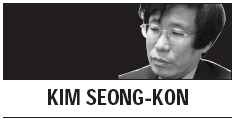Last week I went to London with some of Korea’s finest writers to participate in the 2014 London Book Fair, to which South Korea had been invited as the Market Focus country. Thanks to the recent popularity of hallyu and advanced Korean technology represented by Samsung, LG and Hyundai, South Korea has become widely and favorably known throughout the world. Accordingly, Korea has been the guest of honor at major international book fairs, including those of Frankfurt in 2005, Beijing in 2012 and Tokyo in 2013.
While in the U.K., I noticed that London has become a multicultural city with huge minority populations. When I was in the U.K. in 1991 as a British Council

scholar at the University of Oxford, few British people were interested in minorities or knew about Korea. Finding out that I was from Korea, not China or Japan, my landlady at Oxford was puzzled and asked me, “Where is Korea?” Today, however, Korea is quite well-known in the U.K. as the country of K-pop, advanced IT and remarkable economic development. According to Dr. Yeon Jae-hoon, professor of Korean at the University of London, the number of students in his class has drastically increased from two in 2002 to 40 in 2014.
During the book fair, the British government treated the Korean delegates not only with warm hospitality but also with utmost respect and courtesy. Lady Camilla, duchess of Cornwall and wife of Prince Charles, highlighted the event by making a surprise visit to the Korean pavilion to encourage Korean publishers and writers. The presence of two Korean dignitaries, Minister Yoo Jin-ryong and Ambassador Lim Sung-nam, too, brightened the Book Fair. In addition, I was very much impressed by the thorough preparations of the British Council. Its staff members were efficient and well-organized, and it was a great pleasure to work with them.
Another change I noticed in London was the growing popularity of Korean writers. Many Brits queued up for autographs from critically acclaimed Korean writers including Shin Kyung-sook, who wrote “Please Look after Mom,” and Hwang Sun-mi, author of “The Hen Who Dreamed She Could Fly.” While signing his books, Yoon Tae-ho pleased his British readers by quickly drawing the protagonist of his best-selling graphic novel “Incomplete Life” beside his autograph.
Though not officially participating in the book fair, the famous Korean novelist Lee Jung-myung brightened the occasion through a successful promotional event for his best-selling novel “The Investigation,” which was just published by Pan Macmillan in London. The 10 participating Koreans novelists also enjoyed seminars (standing room only). And they were interviewed by the BBC, The Times, The Telegraph, The Guardian and Financial News.
Another change I noticed was the universal appeal of Korean writers to international readers. In his seminar “Writing Literature after History” Hwang Sok-young said, “When I was young, I thought I could change the world by writing social protest novels. But I’ve changed. These days, I am more interested in depicting private issues such as relationships between human beings.” In “Writing Home: Migrant Literature,” Kim In-suk, too, said, “Thirty years ago, I thought literature should serve as a vehicle for social change. At that time, therefore, I wrote about other people. Now I’ve changed. Nowadays, I am writing about myself, constantly asking, ‘Who am I?’”
Referring to his novel “The Republic is Calling You,” Kim Young-ha pointed out that the book is not so much a spy novel as a story of relocation and living in a diaspora. That is, it is an account of a man who came to South Korea involuntarily from the North due to the tragic division of the country. Kim said, “This novel is, in fact, about the protagonist’s spiritual exile.” British readers were also fascinated by Hwang Sok-young’s novel “The Guest,” which delineates the clash between two uninvited guests from the West in the early 20th century: a Christian and a communist. Listening to them, I was pleased to find that our writers are free from political ideologies at last, whether left- or right-leaning.
Aside from the writers mentioned above, I also brought two internationally well-known writers to London: Yi Mun-yol and Lee Seung-u. There was some encouraging news; some of Kim Hye-soon’s poems just appeared in the spring issue of London’s “Modern Poetry in Translation,” and her collection of poems was also just published by Bloodaxe. Meanwhile, Han Kang’s “The Vegetarian” is scheduled to be published in London next spring. And encouraged by the huge success of Hwang Sun-mi’s novel, Penguin is now interested in publishing a Korean literature series.
At the London Book Fair I saw four banners hanging in four directions, bearing the names of four great British writers: Chaucer, Shakespeare, Austen and Dickens. Returning from London, I thought how nice it would be if someday Korea, too, would be able to hang banners bearing her great writers’ names in major cities of the world.
By Kim Seong-kon
Kim Seong-kon is a professor of English at Seoul National University and president of the Literature Translation Institute of Korea. ― Ed.






![[Herald Interview] 'Trump will use tariffs as first line of defense for American manufacturing'](http://res.heraldm.com/phpwas/restmb_idxmake.php?idx=644&simg=/content/image/2024/11/26/20241126050017_0.jpg)
![[Exclusive] Hyundai Mobis eyes closer ties with BYD](http://res.heraldm.com/phpwas/restmb_idxmake.php?idx=644&simg=/content/image/2024/11/25/20241125050044_0.jpg)
